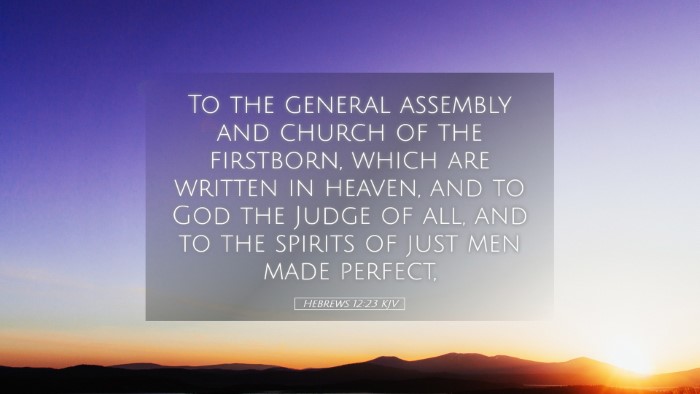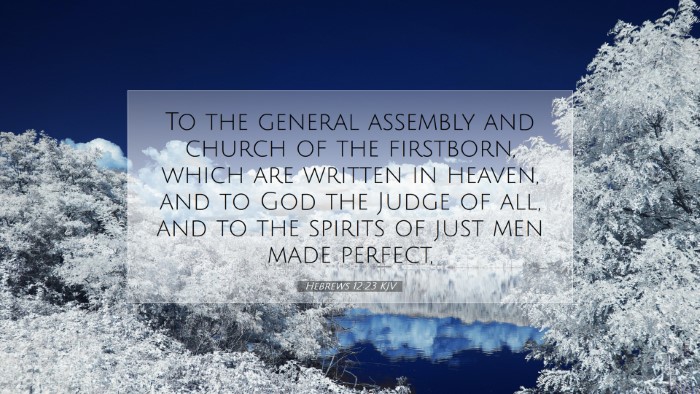Hebrews 12:23 Commentary
Verse Text: "To the general assembly and church of the firstborn, which are written in heaven, and to God the Judge of all, and to the spirits of just men made perfect."
Introduction
The author of Hebrews presents a profound conclusion to his exhortations on faith, perseverance, and the heavenly calling in this particular verse. It encapsulates the Christian's ultimate destination and the community that believers are a part of. In this analysis, we draw insights from respected public domain commentators such as Matthew Henry, Albert Barnes, and Adam Clarke, aiming to unlock the depths of this rich text for pastors, students, and theologians.
Exegesis of Hebrews 12:23
This verse stands as a beacon of hope and assurance for believers, outlining the nature and characteristics of the community to which they belong.
General Assembly and Church of the Firstborn
Matthew Henry emphasizes the idea of the "general assembly" as the gathering of all redeemed believers around God in heaven. This gathering is not limited by time or space; it transcends all earthly divisions and denominations. Henry notes that this assembly includes the universal church, which consists of all who have been saved by the grace of Christ, likening it to a grand reunion in the heavenly realms.
Albert Barnes further elucidates the term "firstborn," connecting it to the primacy of Christ, who is the firstborn among many brethren (Romans 8:29). Barnes highlights that those who belong to this assembly are firstborn as well, signifying their privileged status as heirs of the Kingdom. Hence, believers should take comfort in their identity as children of God, sharing in the inheritance of Christ.
Written in Heaven
When the verse mentions that these individuals are "written in heaven," Adam Clarke points out that this is a metaphorical expression signifying divine recognition. The reference implies that the names of the faithful are inscribed in the heavenly records, symbolizing eternal security in God's sight. Clarke emphasizes the certainty and permanence of this inscription, contrasting it with earthly records that may fade or be lost over time.
God the Judge of All
The phrase "to God the Judge of all" elevates the discourse to a solemn reminder of divine authority. Matthew Henry comments on the dual nature of God as both Judge and Redeemer, providing a balanced view of His character. This aspect serves as both comfort and a warning, urging believers to live righteously in anticipation of the final judgment.
Albert Barnes echoes these thoughts, underscoring the impartiality and absolute justice of God as mentioned in Romans 2:6. Clarke elaborates even further, noting the significance of "Judge"—that He justly evaluates the lives of believers and non-believers alike. A thorough understanding of God's judgment equips believers to live in holiness and accountability.
Spirits of Just Men Made Perfect
The final phrase, "spirits of just men made perfect," opens avenues to explore the transformative work of God in the lives of believers. Henry suggests that this refers to the collective redeemed, those who have been justified through faith and are now made perfect in Christ. This contrasts with the imperfect state of believers on earth, offering hope for eventual completion in the heavenly realm.
Barnes posits that this perfection is not only positional but also progressive, emphasizing that while believers are justified, they are continually being sanctified until they reach their heavenly home. Clarke adds that these "just men" are those who have passed on, enlightening the present community of believers about the legacy and witness of those who have gone before them. This perspective encourages perseverance amongst the living, reminding them of their connection to the great cloud of witnesses.
Theological Implications
Hebrews 12:23 carries with it profound theological implications that are vital for pastoral teaching and personal application.
Communion of Saints
This passage strongly supports the doctrine of the communion of saints. The recognition of being part of a general assembly in heaven fosters unity in the body of Christ. It compels believers to view themselves not just as solitary beings but as interconnected members of a larger family. This social dimension of salvation has implications for church life, accountability, and cooperation among Christians.
Eschatological Fulfillment
The verse also emphasizes an eschatological dimension, reminding believers of their future hope. For students and theologians, it raises questions about the nature of heaven, the fulfillment of promises, and the final state of believers. Such insights encourage ongoing study and reflection on the biblical narrative concerning redemption and finality.
Call to Holiness
Finally, the verse serves as a clarion call to holiness and perseverance. Understanding that they are part of a grand assembly, judged by a holy God, and connected with the perfected spirits should motivate believers to pursue lives of holiness. Pastors can use this as a springboard for calls to righteousness and discipleship in their congregations.
Conclusion
Hebrews 12:23 invites believers into a deeper understanding of their identity in Christ and their destiny. Through the insights of Matthew Henry, Albert Barnes, and Adam Clarke, we see a holistic view that encompasses divine grace, community, and accountability. Pastors, students, theologians, and scholars alike can draw inspiration from this verse to not only comprehend the profound theological implications but also to implement these truths in everyday living.


